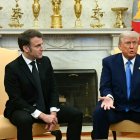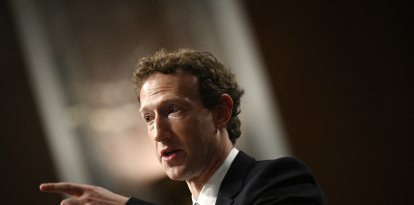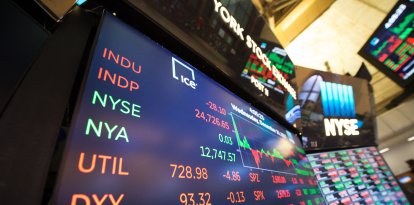Wall Street suffers its worst day since March 2020 in the wake of Trump's tariffs, with losses of $3.1 billion and investors panicked
Uncertainty has gripped investors in the face of volatility and almost zero predictability from the Trump Administration.

Traders work the trading floor of the New York Stock Exchange
As the world watched in amazement on mega-tariff plan announced by President Donald Trump from the Rose Garden, investors like fund manager Rob Citrone knew exactly what was happening and how they should react: betting against U.S., European and Chinese stocks.
“I should have sold more,” Citrone admitted to the Wall Street Journal, explaining that they couldn't believe the move announced by the White House, which went all-in with what it labeled "reciprocal tariffs" on virtually everyone, a policy that had already been announced by many Trump administration officials, but which many analysts interpreted as impossible to carry out or a mere diplomatic negotiating tactic.
In fact, many, many people thought that Trump would not go that far, so much so that during the first part of Trump's speech, the market rallied. Citrone interpreted the market rally as "crazy" and redoubled his downside bet.

Opinion
Liberation Day: ¿qué consecuencias pueden traer las medidas arancelarias de Trump?
Vanessa Vallejo
His reading and timing were near-perfect. Within minutes, Trump announced the plan that most analysts did not foresee, thinking the tariffs would not be so broad, massive and all at once. The stock market plunged in a matter of moments.
The data are stark: the major stock indexes simply suffered their worst day since 2020, when the pandemic hit everyone. The Dow Jones Industrials fell 1,679 points, down 4%; while the Nasdaq Composite, of the technology sector, plunged 6%. In hard numbers, the U.S. market lost approximately $3.1 trillion in capitalization, the worst drop since March 16 five years ago.
Even gold, usually a reliable asset, fell, which was also unproductive for investors who sought to shield themselves in Treasury bonds.
Stephen Solaka, managing partner of Belmont Capital Group, said all this unpredictability and volatility is creating a macroeconomic environment never seen before.
Solaka's clients, who in the face of downturns usually opted to buy stocks on the downside hoping for a recovery, in this case were not interested at all in risking their money, thinking that the market might not be able to recover.
According to Solake, most, contrary to past experience, were looking to reduce risk in the face of real fears of a recession.
In fact, according to Polymarket, a cryptocurrency-based forecasting platform, the odds of a U.S. recession this year increased from 38% to 48% following Trump's announcement.

Economía
Reciprocal tariffs cause Apple to lose more than $300 billion in market value in a single day
Emmanuel Alejandro Rondón
According to a report in the Wall Street Journal, investors are genuinely panicked and expectant about how the market will continue to react, even more so than in the pandemic era, when the government responded to sharp stock market crashes with stimulus measures to accelerate recovery. But this is another White House and a very different and unpredictable Administration.
In fact, far from backing down, White House officials came out in unison to support Trump's plan, who assured that there will soon be a stock market and economic reboundo.



























